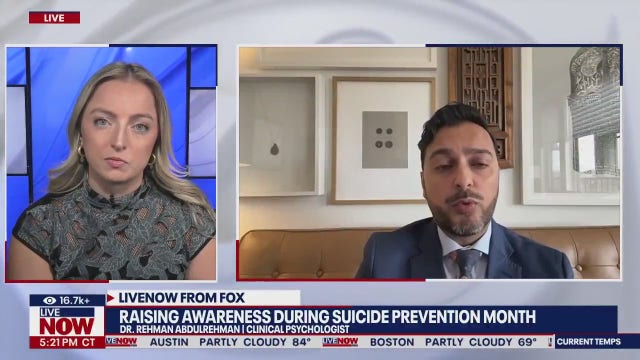Trump administration to end LGBTQ+ youth support on 988 crisis line
The 988 Lifeline will end its LGBTQ+ youth support option in July, raising concern among advocates.
The 988 Lifeline will end its LGBTQ+ youth support option in July, raising concern among advocates.
Election stress disorder is real. Here's how to cope with 3 weeks to go
With less than three weeks until Election Day, the Kamala Harris-Donald Trump news blitz can be a lot to handle. Here’s how experts say you can counter election anxiety.
With less than three weeks until Election Day, the Kamala Harris-Donald Trump news blitz can be a lot to handle. Here’s how experts say you can counter election anxiety.
FDA advisers reject MDMA therapy to treat PTSD
FDA advisers raised concerns about clinical trials and questioned study data and potential safety risks of MDMA, including heart problems.
FDA advisers raised concerns about clinical trials and questioned study data and potential safety risks of MDMA, including heart problems.
ADHD diagnosed in about 1 in 9 US children, CDC says
ADHD symptoms include difficulty staying focused, excessive fidgeting, acting without thinking and difficulty with self-control.
ADHD symptoms include difficulty staying focused, excessive fidgeting, acting without thinking and difficulty with self-control.
Cat owners could be at higher risk of schizophrenia, study suggests
Snuggling with a cat seems like a loving and relaxing activity, but a new study implies that it might affect your mental health down the line.
Snuggling with a cat seems like a loving and relaxing activity, but a new study implies that it might affect your mental health down the line.
First signs of gloomy winter weather can trigger seasonal depression, seasonal affective disorder
Treatment methods for season depression include light boxes, sitting in sunlight when possible and getting physical activity.
Treatment methods for season depression include light boxes, sitting in sunlight when possible and getting physical activity.
US suicide rate reached highest number ever last year
Experts caution that suicide is complicated, and that recent increases might be driven by higher rates of depression or limited availability of mental health services.
Experts caution that suicide is complicated, and that recent increases might be driven by higher rates of depression or limited availability of mental health services.
Surgeon general warns social media can have 'profound risk of harm' for kids
Could social media for kids be regulated next, like car seats and baby formula? The U.S. surgeon general is pushing policymakers to consider change in a new report on social media and youth mental health.
Could social media for kids be regulated next, like car seats and baby formula? The U.S. surgeon general is pushing policymakers to consider change in a new report on social media and youth mental health.
US veterans in suicidal crisis now eligible for free emergency care at any facility
Veterans do not need to be enrolled in the VA system for the new policy, which includes inpatient care for up to 30 days and outpatient care for up to 90 days.
Veterans do not need to be enrolled in the VA system for the new policy, which includes inpatient care for up to 30 days and outpatient care for up to 90 days.
Calls, texts and chats pouring into new 988 mental health helpline
The 988 mental health helpline has quickly expanded its reach in the six months since it launched — with over 2 million calls, texts and chat messages pouring in.
The 988 mental health helpline has quickly expanded its reach in the six months since it launched — with over 2 million calls, texts and chat messages pouring in.
Study: Children who habitually check social media may experience major brain changes
Researchers said habitual social media checking in teens is impacting their brain development at a time when they're already going through "significant structural and functional reorganization."
Researchers said habitual social media checking in teens is impacting their brain development at a time when they're already going through "significant structural and functional reorganization."
TikTok boosts posts about eating disorders, suicide, report says
The findings come from the Center for Countering Digital Hate, which created TikTok accounts for fictitious young people living in the U.S., Britain, Canada and Australia.
The findings come from the Center for Countering Digital Hate, which created TikTok accounts for fictitious young people living in the U.S., Britain, Canada and Australia.
Having a strong sense of purpose in life may help you live longer, study suggests
The study found an association across race/ethnicity and gender, but women may benefit slightly more from the health-protective benefits of having a sense of purpose.
The study found an association across race/ethnicity and gender, but women may benefit slightly more from the health-protective benefits of having a sense of purpose.
Dwayne ‘The Rock’ Johnson opens up about mental health: ‘You gotta ask for help’
"As guys, we have a tendency to not ask for help. Ego gets in the way, and we start stuffing things deep down in our guts, which is not a good thing," Johnson said.
"As guys, we have a tendency to not ask for help. Ego gets in the way, and we start stuffing things deep down in our guts, which is not a good thing," Johnson said.
Utah man jumps into icy river to save woman attempting suicide
“I told her ‘I don’t know who you are, but I’m here and I love you, and I’m going to help you,’” Dane Entze said.
“I told her ‘I don’t know who you are, but I’m here and I love you, and I’m going to help you,’” Dane Entze said.
Binge eating disorder looks different in the brains of boys and girls, study finds
The study findings may help future efforts to better understand the origins of eating disorders and how they differ between sexes, researchers said.
The study findings may help future efforts to better understand the origins of eating disorders and how they differ between sexes, researchers said.
Study finds spike in children going to ER with suicidal thoughts — even before pandemic
Before COVID-19 wreaked havoc on mental health, there was already a surge of youth visits to emergency departments for suicidal thoughts between 2016 and 2019, the study says.
Before COVID-19 wreaked havoc on mental health, there was already a surge of youth visits to emergency departments for suicidal thoughts between 2016 and 2019, the study says.
Synthetic 'magic mushroom' drug may ease depression in hard-to-treat patients, study says
A single dose of psilocybin, the hallucinogenic compound found in “magic mushrooms,” was found to help some people who previously had gotten little relief from standard antidepressants.
A single dose of psilocybin, the hallucinogenic compound found in “magic mushrooms,” was found to help some people who previously had gotten little relief from standard antidepressants.
Forcing a smile might put you in a better mood, research suggests
The new research, led by a scientist at Stanford, may tell us “something fundamentally important” about how human emotions work.
The new research, led by a scientist at Stanford, may tell us “something fundamentally important” about how human emotions work.
Seeing, listening to birds can improve mental health, study finds
In addition to helping people, scientists say they are also advocating for the protection of the environment and wildlife.
In addition to helping people, scientists say they are also advocating for the protection of the environment and wildlife.





















